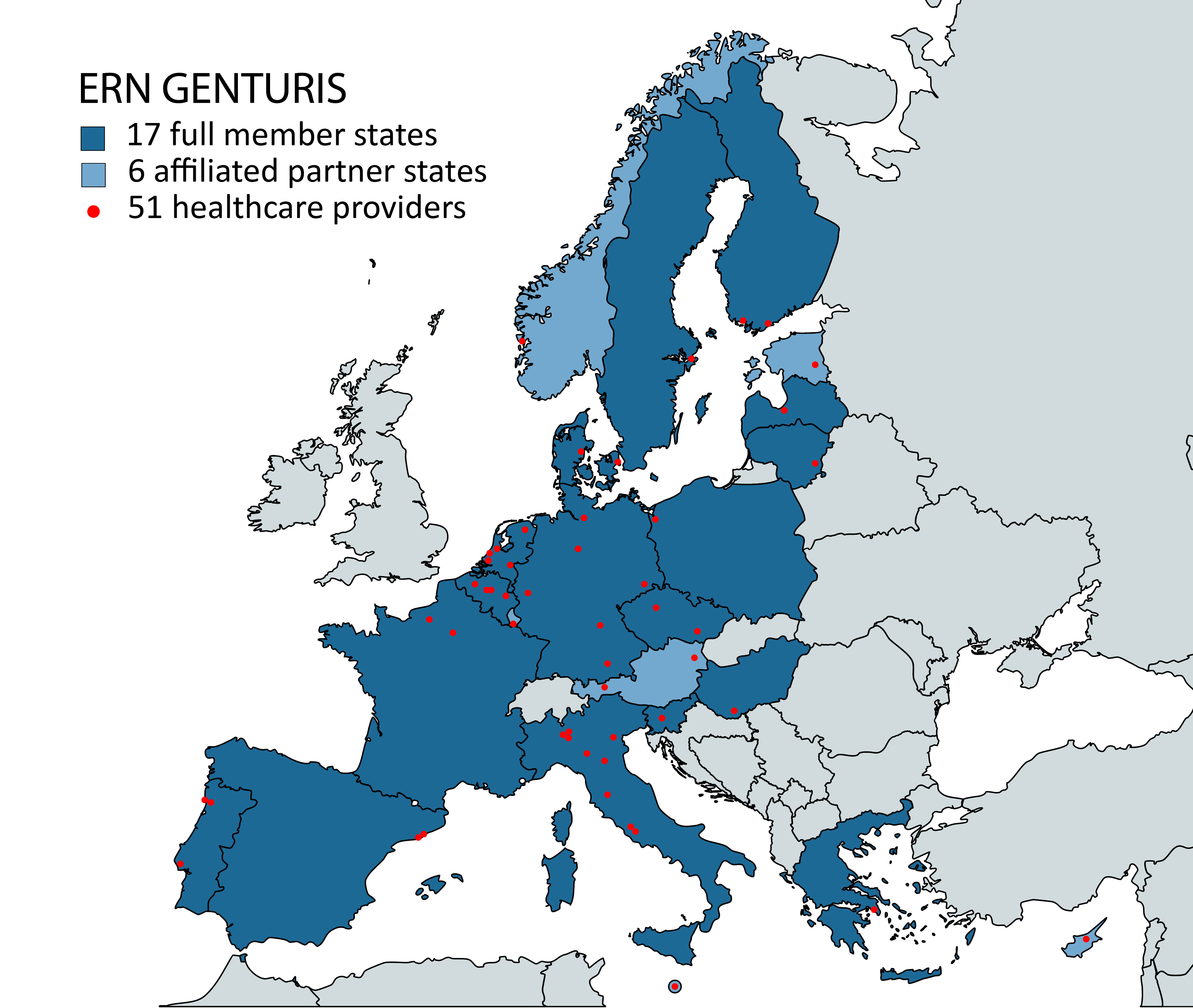About ERN GENTURIS
ERN GENTURIS is the European Reference Network (ERN) for all patients with one of the rare and/or complex genetic tumour risk syndromes (genturis).
Created in March 2017, ERN GENTURIS begun with 23 Full Members in 12 EU countries. In 2020, 9 Associated National Centres and 2 Hubs from 8 additional EU countries were designated by its Member States.
In 2021, as a result of the call for membership to the existing European Reference Networks (ERNs), 25 new HCPs were approved to join ERN GENTURIS.
As of November 2023, 51 HCPs in 23 countries are members of ERN GENTURIS:
17 Member States with 44 Full Members
4 Member States with 5 Associated National Centres
2 Member States with a Coordination Hub
The remaining EU countries not yet included in ERN GENTURIS are: Bulgaria, Croatia, Ireland, Romania and Slovakia.
Due to the Brexit, 3 UK centres lost their Full Membership on 1 January 2021. These UK members signed Supporting Partners' Agreement with ERN GENTURIS.
Health professionals and patients considering a genetic test to look for inherited cause of cancer should visit: www.cancergenetics.eu for further information
The patients with genetic tumour risk syndromes are at very high hereditary risk of developing multiple tumours, which are often located in multiple organ systems.
In case they are diagnosed with cancer they may need different treatment and follow-up as compared to non-hereditary cancers. The lifetime risk of cancer can be as high as 100%.
While there is considerable diversity in the organ systems that may be affected, individuals affected by these conditions share similar challenges:
- delay in diagnosis,
- lack of prevention for patients and healthy relatives,
- and therapeutic mismanagement.
There are 4 thematic groups of genturis syndromes:
- TG1: Schwannomatosis and neurofibromatosis
- TG2: Lynch syndrome and polyposis
- TG3: Hereditary breast and ovarian cancer
- TG4: Other rare - predominantly malignant - syndromes
ERN GENTURIS is working to improve identification of these syndromes, to minimise variation in clinical outcomes, to design and implement EU-guidelines, develop the GENTURIS registry, support research, and empower patients.
The network is educating the public and healthcare professionals via the website www.genturis.eu, by organising regular webinars and courses, and by fostering sharing of best practice across Europe. Access to multidisciplinary care (digital as well as face-to-face) will be improved, to share and discuss complex cases. The network is enhancing the quality and interpretation of genetic testing, and increasing patient participation in clinical research programmes.
The aims of ERN GENTURIS are
- Improved identification of people living with a genetic tumour risk syndrome
- Reduced variation in clinical practice and outcomes
- Development of evidence based clinical guidelines
- Development and use of patient registries, biobanks and research studies
- Defined health care pathways to facilitate improved access to international specialist clinical knowledge for patients and their families living throughout the EU
- Pan-European Development and use of patient registries, biobanks and research studies
ERN GENTURIS takes a family-based approach, focussing not just on the individual but also their relatives who may also be at risk given the hereditary nature of the conditions.
ERN GENTURIS is coordinated by Radboud university medical center in Nijmegen, the Netherlands.
Additional information on the ERN GENTURIS network is available for download here.
Our patient representatives
Click here to meet the ERN GENTURIS patient representatives.


